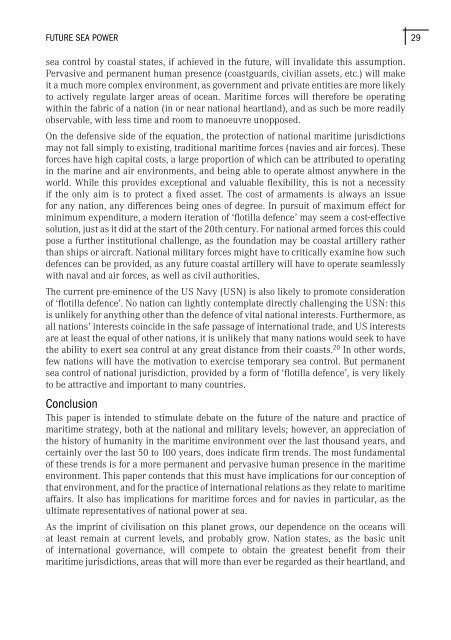Australian Maritime Issues 2005 - Royal Australian Navy
Australian Maritime Issues 2005 - Royal Australian Navy
Australian Maritime Issues 2005 - Royal Australian Navy
Create successful ePaper yourself
Turn your PDF publications into a flip-book with our unique Google optimized e-Paper software.
FUTURE SEA POWER<br />
29<br />
sea control by coastal states, if achieved in the future, will invalidate this assumption.<br />
Pervasive and permanent human presence (coastguards, civilian assets, etc.) will make<br />
it a much more complex environment, as government and private entities are more likely<br />
to actively regulate larger areas of ocean. <strong>Maritime</strong> forces will therefore be operating<br />
within the fabric of a nation (in or near national heartland), and as such be more readily<br />
observable, with less time and room to manoeuvre unopposed.<br />
On the defensive side of the equation, the protection of national maritime jurisdictions<br />
may not fall simply to existing, traditional maritime forces (navies and air forces). These<br />
forces have high capital costs, a large proportion of which can be attributed to operating<br />
in the marine and air environments, and being able to operate almost anywhere in the<br />
world. While this provides exceptional and valuable flexibility, this is not a necessity<br />
if the only aim is to protect a fixed asset. The cost of armaments is always an issue<br />
for any nation, any differences being ones of degree. In pursuit of maximum effect for<br />
minimum expenditure, a modern iteration of ‘flotilla defence’ may seem a cost-effective<br />
solution, just as it did at the start of the 20th century. For national armed forces this could<br />
pose a further institutional challenge, as the foundation may be coastal artillery rather<br />
than ships or aircraft. National military forces might have to critically examine how such<br />
defences can be provided, as any future coastal artillery will have to operate seamlessly<br />
with naval and air forces, as well as civil authorities.<br />
The current pre-eminence of the US <strong>Navy</strong> (USN) is also likely to promote consideration<br />
of ‘flotilla defence’. No nation can lightly contemplate directly challenging the USN: this<br />
is unlikely for anything other than the defence of vital national interests. Furthermore, as<br />
all nations’ interests coincide in the safe passage of international trade, and US interests<br />
are at least the equal of other nations, it is unlikely that many nations would seek to have<br />
the ability to exert sea control at any great distance from their coasts. 20 In other words,<br />
few nations will have the motivation to exercise temporary sea control. But permanent<br />
sea control of national jurisdiction, provided by a form of ‘flotilla defence’, is very likely<br />
to be attractive and important to many countries.<br />
Conclusion<br />
This paper is intended to stimulate debate on the future of the nature and practice of<br />
maritime strategy, both at the national and military levels; however, an appreciation of<br />
the history of humanity in the maritime environment over the last thousand years, and<br />
certainly over the last 50 to 100 years, does indicate firm trends. The most fundamental<br />
of these trends is for a more permanent and pervasive human presence in the maritime<br />
environment. This paper contends that this must have implications for our conception of<br />
that environment, and for the practice of international relations as they relate to maritime<br />
affairs. It also has implications for maritime forces and for navies in particular, as the<br />
ultimate representatives of national power at sea.<br />
As the imprint of civilisation on this planet grows, our dependence on the oceans will<br />
at least remain at current levels, and probably grow. Nation states, as the basic unit<br />
of international governance, will compete to obtain the greatest benefit from their<br />
maritime jurisdictions, areas that will more than ever be regarded as their heartland, and

















